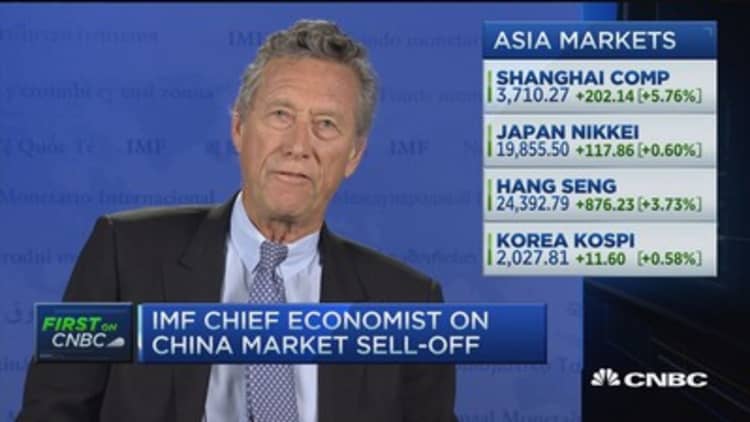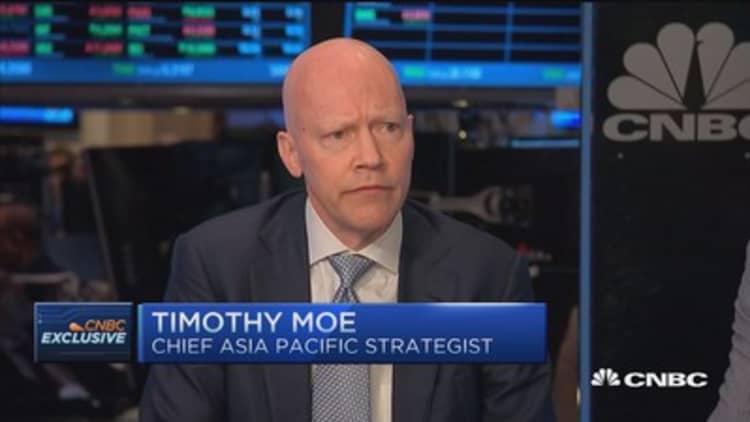


The burst of China's stock bubble doesn't spell doom for U.S. stocks, most analysts believe. But the ugly unwind of the euphoric rally reminds the West just how much the world depends on China. (Tweet This)
"It's more than a Chinese stock story. It's what's happening with global growth," said Gregory Peters, senior portfolio manager at Prudential Fixed Income. "The bond market is reacting to commodity markets and China more than anything else."
Bond yields hit a low this week amid the Chinese selloff and the constant headlines about the Greek debt crisis. Commodities also collapsed, with copper at a six-year low and iron ore futures plunging, before rebounding Thursday.
The Chinese market's plunge has been violent. Despite fresh policy measures nearly every day, stocks continued to plummet, sometimes with intraday swings of more than 5 percent. But on Thursday, shares seemed to respond to the latest measures—a prohibition against selling by some large shareholders.
The mainland stocks, known as A-shares, shot higher as China also loosened regulations around margin lending.
The had its best daily gain in six years amid a restricted market—trade in roughly half of the mainland-listed stocks is suspended, adding to liquidity concerns.
The government didn't have as much success with a series of policy measures announced a few days earlier, which included provision of liquidity for margin trading and a pause in initial public offerings. The government is also cracking down on short selling and speculation swirled locally that it would arrest short sellers, according to news reports.
Since surging more than 150 percent to a seven-year peak on June 12, the Shanghai composite has tumbled nearly 30 percent, and on a second mainland exchange, Shenzhen A-shares fell about 40 percent. The Hong Kong-listed H-shares have been more stable but were also hit by selling.
Jonathan Golub, chief U.S. market strategist at RBC Capital Markets, said he's not worried about the Chinese stock market woes spilling over to the U.S. stock market. But he said the Chinese market meltdown changes the calculus for investors who were expecting China to restart its growth engine, helping lift other economies.
Golub said growth in China has slowed and that's been clear in freight shipments and electricity use.
"What you see is the growth rolled over not just recently but more broadly. The U.S. market is not going to fall apart because of this. ... But I do think it's an important element of a broader story if people convinced themselves that China was going to pull the economy forward," he said. "China as a solution to the world's problems is not something we should look to."
Many analysts are still confident in the Chinese government's ability to prevent a catastrophic selloff.
"The Chinese government is playing a reactive game, and can't move fast enough, even with the trading halts, to reverse the damage to the onshore A-shares market," said Clem Miller, investment analyst at Wilmington Trust Advisors, which oversees $78 billion.
To be sure, China's economic growth is not seen as highly correlated with the local stock performance—so far. Even at a slight slowdown from previous years, national GDP is expected to grow by 6 percent or more this year, compared with the maximum forecast of 3 percent growth in the United States.
"If (China) had economic difficulties they'll deal with it much more quickly," said Howard Silverblatt, senior index analyst at S&P Dow Jones Indices. "The economic stuff is a lot bigger."
He noted that for S&P companies, Asia is now a greater source of revenue than Europe.
"That doesn't account for any of the production work done in Asia," he said.
Tech companies such as Apple have long relied on factories in China to manufacture their products. As the middle class continues to grow in spite of macroeconomic headwinds, the massive nation is an important consumer base for Apple, fast food chains and homegrown e-commerce companies such as Alibaba.
"While it is hard to draw a line of where this correction would end, we believe there are still merits to investing in China in the long run, including capital account liberalization and selected sectors that benefit from strategic policies and the rise of the middle class," said Tai Hui, chief market strategist in Asia at JPMorgan Funds.
The materials sector has the highest positive correlation to the mainland stocks, RBC research showed. That makes sense because on a more fundamental level, commodities are heavily dependent on China. In its midyear report, Barclays based its outlook on commodities primarily on growth in China.
"Copper fell particularly sharply in Q2 as China slowed, but we think it now looks undervalued and of the metals that we track, it has the best prospects to achieve higher prices over the next few months, in our view. This is based mainly on a pickup in Chinese consumption over the next few months as GDP rebounds, and there are signs that this process is already starting," the Barclays note said.
However, for the average U.S. investor, most analysts recommend staying away from the Chinese bear market. Both the Shanghai and Shenzhen indexes of A-shares are now firmly in a bear market, with Shenzhen off about 40 percent from its recent highs and is now one of the worst-performing indexes in the world.
"We anticipate further downside risk for Chinese equities," Wells Fargo Investment Institute global research analyst Peter Donisanu said in a Monday note. "We continue to advise investors to consider not holding individual positions in Chinese stocks but advocate for fully diversified exposure to emerging market equities."
That exposure to China should come through the Hong Kong-listed H-shares, which are more stable investments due to a longer track record and the exchange's stricter accounting standards.
"While H-shares are caught up in the 'sell everything China' rout, we expect institutional investors to look to H-shares first when they re-enter," Miller said.
H-share China funds
iShares China Large-Cap (FXI)
iShares MSCI Hong Kong (EWH)
iShares MSCI China (MCHI)
SPDR S&P China (GXC)
iShares MSCI Emerging Markets (EEM) *approximately 25 percent allocation to China primarily based on H-shares.
A-share China funds
Deutsche X-trackers Harvest CSI 300 China A-Shares ETF (ASHR)
KraneShares Bosera MSCI China A ETF (KBA)
PowerShares China A-share ETF (CHNA) *tracks SGX FTSE China A50 Index futures
JPMorgan's China Region Fund (JFC) ~25% allocation to A-shares
Vanguard FTSE Emerging Markets ETF (VWO) *will add A-shares gradually, none in it so far
Read More
"It's never been a market where fundamentals mattered and that's not going to change soon," said Kevin Carter, founder of EMQQ, The Emerging Markets Internet & Ecommerce ETF.
In addition, the Shanghai composite is still up nearly 15 percent year to date.
"Whatever was lost in the last six weeks didn't exist in January," he said.


